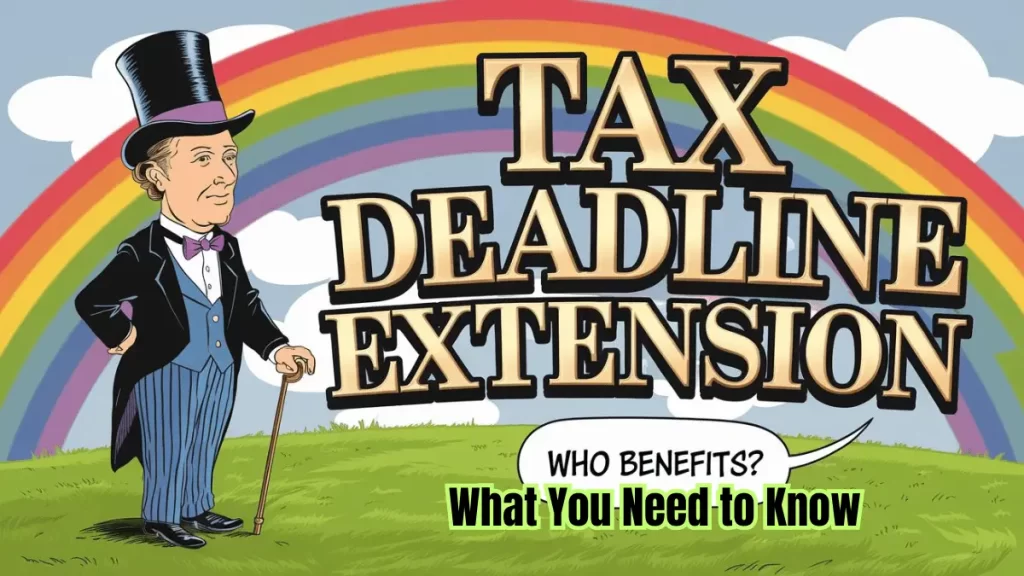Tax Filing Dete Extension: More time for better financial planning and accuracy.
Tax Deadline Extension: In a surprising move that’s set to bring relief to millions of Americans, the Internal Revenue Service (IRS) has announced a significant extension to the tax filing deadline for 2024. This unexpected development is poised to reshape the upcoming tax season and offers a wealth of benefits for taxpayers across the nation.

Understanding the Tax Deadline Extension
The IRS decision to extend the tax deadline comes as welcome news to many who often find themselves racing against the clock to file their returns. While the exact details of the extension are still being finalized, early indications suggest that taxpayers will have several additional weeks, if not months, to complete their filings without incurring late penalties.
Also read The Hidden Truth: How the IRS Monitors Your Financial Life
Historical Context of Tax Filing Dete Extension
This isn’t the first time the IRS has granted extensions, but it’s certainly one of the most substantial in recent years. During the COVID-19 pandemic, similar extensions were provided to help taxpayers cope with the unprecedented circumstances. However, this 2024 extension appears to be proactive rather than reactive, signaling a potential shift in the IRS’s approach to tax season management.
IRS Tax Filing Date Extension: Why This Matters
For the average taxpayer, this extension could be a game-changer. Here’s why:

- Reduced Stress: The extra time alleviates the pressure of gathering documents and rushing through the filing process.
- Improved Accuracy: With more time to review, the likelihood of errors on tax returns may decrease.
- Better Financial Planning: The extension allows for more thoughtful consideration of tax strategies and deductions.
- Flexibility for Complex Situations: Those with complicated tax situations will have additional time to consult with professionals and ensure compliance.
Tax Filing Date Extension by IRS: Economic Impact
The extension could have broader economic implications:
Guideline of Tax Strategies of the Wealthy: Insights from a Top Tax Expert
- Smoother Cash Flow: Businesses and individuals may have more time to manage their cash flow before making tax payments.
- Potential for Increased Refunds: With more time to review deductions and credits, some taxpayers might find they’re eligible for larger refunds.
- Reduced Burden on Tax Professionals: The extended deadline could help spread out the workload for accountants and tax preparers, potentially improving service quality.
Who Benefits?

The extension is expected to benefit a wide range of taxpayers, including:
- Individual filers
- Small business owners
- Freelancers and gig economy workers
- Those with complex financial situations
Special Considerations for Different Groups
Small Business Owners
For small business owners, this extension provides extra time to:
- Reconcile financial records
- Assess equipment purchases for potential deductions
- Evaluate employee benefit programs and their tax implications
Freelancers and Gig Workers
Gig economy participants can use this time to:
- Organize receipts for business expenses
- Calculate home office deductions more accurately
- Review client payments and issue necessary 1099 forms
Individuals with Investments
Those with diverse investment portfolios can:
- Gather all necessary documentation from various financial institutions
- Analyze capital gains and losses for optimal tax reporting
- Consider tax-loss harvesting strategies
Making the Most of the Extension
While the deadline extension offers breathing room, it’s crucial to use this time wisely. Here are some expanded tips to maximize the benefits:

- Start Early:
- Begin gathering documents as soon as possible
- Create a checklist of needed items (W-2s, 1099s, mortgage statements, etc.)
- Set up a filing system for easy access to important documents
- Seek Professional Advice:
- Schedule consultations with tax professionals early
- Prepare a list of questions or concerns to discuss
- Consider a mid-year tax review to plan for the following year
- Review Past Returns:
- Look for consistently overlooked deductions
- Check for carryover items like capital losses or charitable contributions
- Identify areas where you might have been too conservative in past filings
- Plan for the Future:
- Reassess your withholdings and estimated tax payments
- Consider opening or contributing to tax-advantaged accounts (IRAs, 529 plans, etc.)
- Evaluate your current financial strategies in light of any recent tax law changes
- Educate Yourself:
- Attend workshops or webinars on tax preparation
- Stay informed about any new tax credits or deductions you might be eligible for
- Familiarize yourself with tax software options if you plan to file on your own
Play Games – Sports to Stocks: Mastering Magic Investment Strategies
Potential Drawbacks to Consider
While the extension offers many benefits, it’s important to be aware of potential drawbacks:
- Delayed Refunds: If you’re expecting a refund, filing later means you’ll receive it later.
- Procrastination Risk: Some taxpayers might be tempted to put off filing even longer, which could lead to last-minute stress.
- Impact on Financial Aid: For those applying for college financial aid, later tax filing might affect the timing of aid applications.
Stay Informed

As with any significant tax change, it’s essential to stay updated on the specifics of the extension as they are released. The IRS website will be the most reliable source for official information regarding new deadlines and any additional guidance.
Additional Resources
- IRS.gov: The official source for tax-related information
- Taxpayer Advocate Service: Offers free help to guide you through the process
- AICPA (American Institute of CPAs): Provides valuable resources and insights for complex tax situations
Conclusion
The IRS decisied to extend the deadline for 2024 represents a significant shift in the usual tax season timeline. While it offers numerous benefits, it’s crucial to use this extra time wisely. By starting early, staying informed, and seeking professional advice when needed, taxpayers can turn this extension into an opportunity for more accurate and beneficial tax filings.
Remember, taxes may not be the most exciting topic, but proper planning and execution can lead to significant financial benefits. Make the most of this unexpected gift of time from the IRS!
Hi there! I am Sudip Sengupta, the face behind “Tfin Career”. Tfin Career is a sole proprietorship finance and consulting firm that makes complex tax and financial concepts easy to understand for everyone. With more than 21 years of experience in the field, I have noticed that people cannot make the right decisions in this field. So, I decided to create “Tfin Career” to help individuals and businesses alike. Here I urge those who are confused to make better choices. Also, it is good news for my dear clients and every visitor that I/we are going to start a training module for those who want to choose a career path in Finance and Taxation. Just follow my website.
Thank you for reading this post, don't forget to subscribe!






